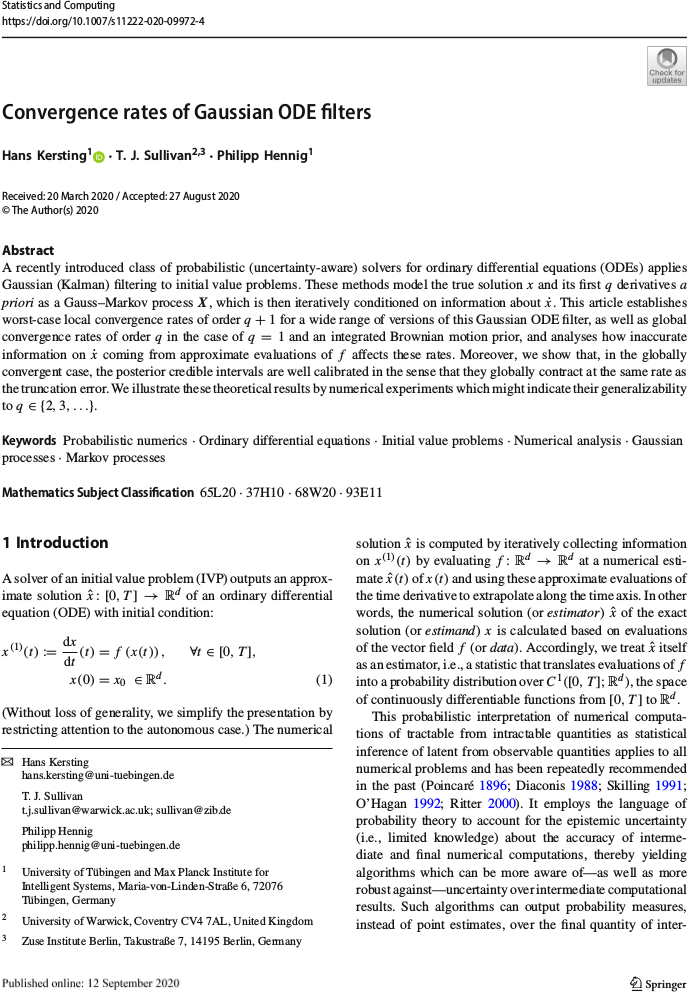#hennig

Convergence rates of Gaussian ODE filters in Statistics and Computing
The paper “Convergence rates of Gaussian ODE filters” by Hans Kersting, Philipp Hennig, and myself has just appeared in the journal Statistics and Computing. In this work, we examine the strong convergence rates of probabilistic solvers for ODEs of the form \(\dot{x}(t) = f(x(t))\) that are based upon Gaussian filtering. In some sense, this work combines the numerical analysis perspective of Conrad et al. (2016) and Lie et al. (2019) with the filtering perspective on probabilistic numerical methods for ODEs of Schober et al. (2014).
H. Kersting, T. J. Sullivan, and P. Hennig. “Convergence rates of Gaussian ODE filters.” Statistics and Computing 30(6):1791–1816, 2020.
Abstract. A recently introduced class of probabilistic (uncertainty-aware) solvers for ordinary differential equations (ODEs) applies Gaussian (Kalman) filtering to initial value problems. These methods model the true solution \(x\) and its first \(q\) derivatives a priori as a Gauss–Markov process \(X\), which is then iteratively conditioned on information about \(\dot{x}\). This article establishes worst-case local convergence rates of order \(q + 1\) for a wide range of versions of this Gaussian ODE filter, as well as global convergence rates of order \(q\) in the case of \(q = 1\) and an integrated Brownian motion prior, and analyses how inaccurate information on \(\dot{x}\) coming from approximate evaluations of \(f\) affects these rates. Moreover, we show that, in the globally convergent case, the posterior credible intervals are well calibrated in the sense that they globally contract at the same rate as the truncation error. We illustrate these theoretical results by numerical experiments which might indicate their generalizability to \(q \in \{ 2, 3 , \dots \}\).
Published on Tuesday 15 September 2020 at 09:00 UTC #publication #stco #prob-num #kersting #hennig
Online Probabilistic Numerics Minisymposia
Like many international conferences, the SIAM Conference on Uncertainty Quantification planned for 24–27 March 2020 had to be postponed indefinitely in view of the Covid-19 pandemic. Undeterred by this, the speakers of four minisymposia on the theme of Probabilistic Numerical Methods have generously taken the time to adapt their talks for a new medium and record them for general distribution. The talks can be found at http://probabilistic-numerics.org/meetings/SIAMUQ2020/.
We hope that these talks will be of general interest. Furthermore, the speakers have declared themselves ready to answer questions in written form. If you would like to ask any questions or contribute to the discussion, then please submit your question via this form by 10 May 2020.
Organised jointly by Alex Diaz, Alex Geßner, Philipp Hennig, Toni Karvonen, Chris Oates, and myself
Published on Friday 24 April 2020 at 10:00 UTC #event #siam #prob-num #diaz #gessner #hennig #karvonen #oates